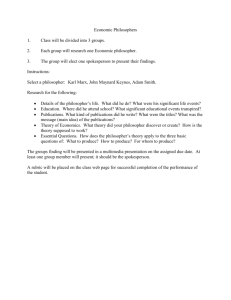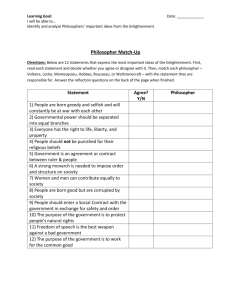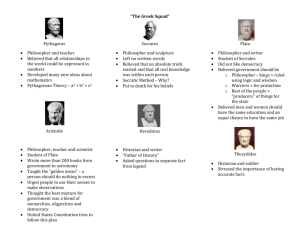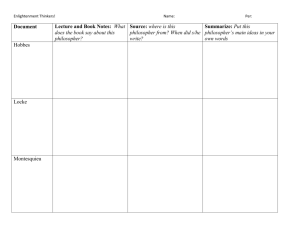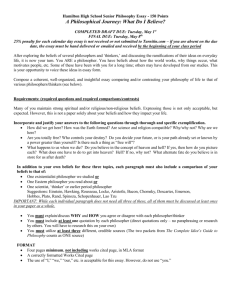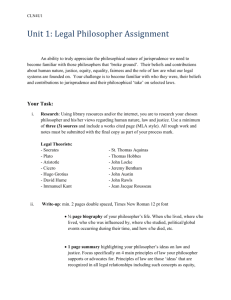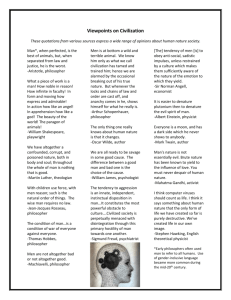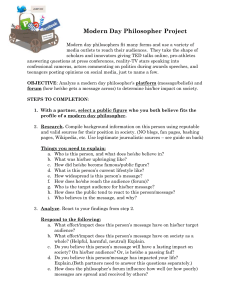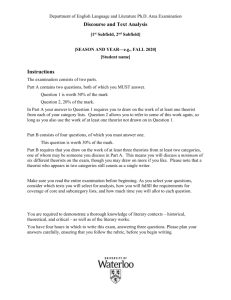Philosopher Assignment
advertisement
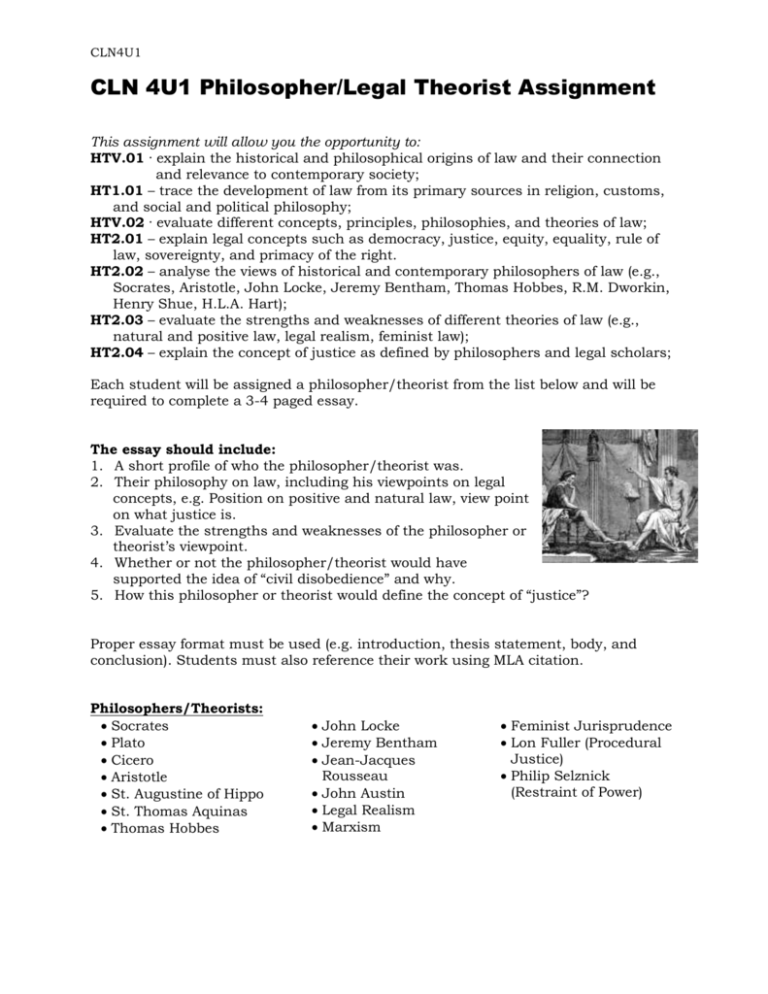
CLN4U1 CLN 4U1 Philosopher/Legal Theorist Assignment This assignment will allow you the opportunity to: HTV.01 · explain the historical and philosophical origins of law and their connection and relevance to contemporary society; HT1.01 – trace the development of law from its primary sources in religion, customs, and social and political philosophy; HTV.02 · evaluate different concepts, principles, philosophies, and theories of law; HT2.01 – explain legal concepts such as democracy, justice, equity, equality, rule of law, sovereignty, and primacy of the right. HT2.02 – analyse the views of historical and contemporary philosophers of law (e.g., Socrates, Aristotle, John Locke, Jeremy Bentham, Thomas Hobbes, R.M. Dworkin, Henry Shue, H.L.A. Hart); HT2.03 – evaluate the strengths and weaknesses of different theories of law (e.g., natural and positive law, legal realism, feminist law); HT2.04 – explain the concept of justice as defined by philosophers and legal scholars; Each student will be assigned a philosopher/theorist from the list below and will be required to complete a 3-4 paged essay. The essay should include: 1. A short profile of who the philosopher/theorist was. 2. Their philosophy on law, including his viewpoints on legal concepts, e.g. Position on positive and natural law, view point on what justice is. 3. Evaluate the strengths and weaknesses of the philosopher or theorist’s viewpoint. 4. Whether or not the philosopher/theorist would have supported the idea of “civil disobedience” and why. 5. How this philosopher or theorist would define the concept of “justice”? Proper essay format must be used (e.g. introduction, thesis statement, body, and conclusion). Students must also reference their work using MLA citation. Philosophers/Theorists: Socrates Plato Cicero Aristotle St. Augustine of Hippo St. Thomas Aquinas Thomas Hobbes John Locke Jeremy Bentham Jean-Jacques Rousseau John Austin Legal Realism Marxism Feminist Jurisprudence Lon Fuller (Procedural Justice) Philip Selznick (Restraint of Power) CLN4U1 Philosopher/Theorist Assignment Helpful resources for this assignment include: Dimensions of Law: Canadian and International Law in the 21st Century. Toronto: Emond Montgomery Publications, 2003. Canadian and International Law. Don Mills: Oxford University Press, 2004. Various books from the library. The following internet resources: GALE / TDSB VIRTUAL REFERENCE LIBRARY (E-BOOKS) ONE STOP ACCESS TO GALE + TDSB E-BOOKS, Stanford Encyclopedia of Philosophy Internet Encyclopedia of Philosophy Natural Law – http://www.newadvent.org/ Philosophers – http://www.wabashcenter.wabash.edu/resources/personal_date.aspx Philosophers – http://www.philosophypages.com/ph/ The Jurists – http://www.blupete.com/Literature/Biographies/Law/Jurists.htm - very short bio’s Your assignment is due on: _________________________________________ 2 CLN4U1 Student: _______________________________________ Topic: ____________________________________ CANADIAN & INTERNATIONAL LAW PHILOSOPHER ASSIGNMENT -- ESSAY EVALUATION LEVEL 1 0%-59% LEVEL 2 60%-69% LEVEL 3 70%-79% LEVEL 4 80%-100% UNSATISFACTORY/SATISFACTORY GOOD VERY GOOD EXCELLENT CATEGORIES/CRITERIA COMMUNICATION Presentation & Organization Ideas Logically & Fully Developed Evidence of Planning Level of Language/Word Choice (appropriate use of terminology) Essay Format(introduction, thesis, body, conclusion, references) Spelling and Grammar Ideas are not fully and/or logically developed. Demonstrates little or no planning. Inappropriate level of language/word usage. Demonstrated little or no attempt of following an essay format. Extremely poor spelling and grammar. Ideas not always logically & fully developed. Some planning is evident. Satisfactory level of language/word usage. Some attempt at following an essay format. Satisfactory spelling and grammar. Ideas are, for the most part, logically & fully developed. Solid planning. Appropriate level of language/ word choice to meet most of the needs of the class. Strong attempt at following an essay format. Good to very good spelling and grammar. Ideas are logically & fully developed. Exceptional planning. Excellent level of language/word choice to meet the needs of the class. Excellent attempt at following an essay format. Excellent spelling and grammar. KNOWLEDGE& UNDERSTANDING Researched Content Knowledge and Understanding of the Contents/issues Information is Relevant, & Topic Appropriate (profile of the Philosopher, their legal viewpoints, etc. Demonstrates limited Demonstrates some evidence Demonstrates considerable Demonstrates both knowledge & understanding of the content/issues. Very little relevant, and topic appropriate information. of knowledge & understanding of the content/issues. Relevant and topic appropriate information provided to a small degree. knowledge & understanding of the content/issues. Relevant and topic appropriate information provided, for the most part. considerable knowledge & a thorough understanding of the content/issues. Relevant and topic appropriate information provided throughout presentation. CLN4U1 CATEGORIES/CRITERIA Philosopher/Theorist Assignment LEVEL 1 0%-59% LEVEL 2 60%-69% LEVEL 3 70%-79% LEVEL 4 80%-100% UNSATISFACTORY/SATISFACTORY GOOD VERY GOOD EXCELLENT THINKING Analysis Uses critical thinking skills to identify strengths and weaknesses. Uses inquiry skills to evaluate philosopher’s/theorist’s viewpoint regarding the use of civil disobedience. Ability to interpret the philosopher’s/theorist’s concept of justice. Comments: Uses critical thinking skills Uses critical thinking skills Uses critical thinking skills Uses critical thinking skills with limited clarity and effectiveness to identify strengths and weaknesses. Applies few of the skills involved in the inquiry process to evaluate philosopher’s/theorist’s viewpoint regarding the use of civil disobedience. Applies few of the skills involved in the inquiry process to interpret the philosopher’s/theorist’s concept of justice. with moderate clarity and effectiveness to identify strengths and weaknesses. Applies some of the skills involved in the inquiry process to evaluate philosopher’s/theorist’s viewpoint regarding the use of civil disobedience. Applies some of the skills involved in the inquiry process to interpret the philosopher’s/theorist’s concept of justice. with considerable clarity and effectiveness to identify strengths and weaknesses. Applies most of the skills involved in the inquiry process to evaluate philosopher’s/theorist’s viewpoint regarding the use of civil disobedience. Applies most of the skills involved in the inquiry process to interpret the philosopher’s/theorist’s concept of justice. with a high degree of clarity and effectiveness to identify strengths and weaknesses. Applies all or almost all of the skills involved in the inquiry process to evaluate philosopher’s/theorist’s viewpoint regarding the use of civil disobedience. Applies all or almost all of the skills involved in the inquiry process to interpret the philosopher’s/theorist’s concept of justice.

